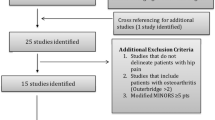Abstract
Purpose
Hip dysplasia and femoroacetabular impingement may both lead to disability and hip osteoarthritis. The purpose of the current study was to compare the two entities in order to define differences in their clinical presentation.
Methods
The clinical presentation and WOMAC items, subscales and overall sum score were compared between 37 patients with femoroacetabular impingement and 37 patients with hip dysplasia.
Results
The average duration of symptoms was 33.3 ± 31.6 months in patients with femoroacetabular impingement and 34.5 ± 39.0 months in patients with dysplasia (p = 0.885). The anterosuperior impingement test was positive in all patients with femoroacetabular impingement and in 92% of hip dysplasia patients (p = 0.061). Mean internal rotation and abduction was significantly less in patients with femoroacetabular impingement (p = 0.001 and 0.007). The WOMAC subscales for pain, stiffness, and functionality as well as the overall sum score were not significantly different between patients with femoroacetabular impingement and patients with hip dysplasia. The qualitative analysis of WOMAC items revealed that symptoms related to sitting were significantly more often rated to be present in femoroacetabular impingement than in hip dysplasia patients. In the quantitative analysis, only the item ‘getting in or out of a car’ was rated significantly more severe in patients with femoroacetabular impingement.
Conclusion
In addition to obtaining a detailed history and examination, radiographic studies are needed for differentiation of the two entities and for the decision on treatment strategy.
Level of evidence
Diagnostic, Level III.

Similar content being viewed by others

References
Beaule PE, Le Duff MJ, Zaragoza E (2007) Quality of life following femoral head-neck osteochondroplasty for femoroacetabular impingement. J Bone Joint Surg Am 89:773–779
Beck M, Kalhor M, Leunig M et al (2005) Hip morphology influences the pattern of damage to the acetabular cartilage: femoroacetabular impingement as a cause of early osteoarthritis of the hip. J Bone Joint Surg Br 87:1012–1018
Beck M, Leunig M, Parvizi J et al (2004) Anterior femoroacetabular impingement: part II. Midterm results of surgical treatment. Clin Orthop Relat Res 418:67–73
Bellamy N, Buchanan WW, Goldsmith CH et al (1988) Validation study of WOMAC: a health status instrument for measuring clinically important patient relevant outcomes to antirheumatic drug therapy in patients with osteoarthritis of the hip or knee. J Rheumatol 15:1833–1840
Byrd JW, Jones KS (2009) Arthroscopic femoroplasty in the management of cam-type femoroacetabular impingement. Clin Orthop Relat Res 467:739–746
Christensen CP, Althausen PL, Mittleman MA et al (2003) The nonarthritic hip score: reliable and validated. Clin Orthop Relat Res 406:75–83
Clohisy JC, Knaus ER, Hunt DM et al (2009) Clinical presentation of patients with symptomatic anterior hip impingement. Clin Orthop Relat Res 467:638–644
Ganz R, Leunig M, Leunig-Ganz K et al (2008) The etiology of osteoarthritis of the hip: an integrated mechanical concept. Clin Orthop Relat Res 466:264–272
Ganz R, Parvizi J, Beck M et al (2003) Femoroacetabular impingement: a cause for osteoarthritis of the hip. Clin Orthop Relat Res 417:112–120
Garbuz DS, Masri BA, Haddad F et al (2004) Clinical and radiographic assessment of the young adult with symptomatic hip dysplasia. Clin Orthop Relat Res 418:18–22
Johnston TL, Schenker ML, Briggs KK et al (2008) Relationship between offset angle alpha and hip chondral injury in femoroacetabular impingement. Arthroscopy 24:669–675
Klaue K, Durnin CW, Ganz R (1991) The acetabular rim syndrome. A clinical presentation of dysplasia of the hip. J Bone Joint Surg Br 73:423–429
Leunig M, Beaule PE, Ganz R (2009) The concept of femoroacetabular impingement: current status and future perspectives. Clin Orthop Relat Res 467:616–622
Leunig M, Podeszwa D, Beck M et al (2004) Magnetic resonance arthrography of labral disorders in hips with dysplasia and impingement. Clin Orthop Relat Res 418:74–80
Martin RL, Kelly BT, Philippon MJ (2006) Evidence of validity for the hip outcome score. Arthroscopy 22:1304–1311
Peters CL, Erickson JA, Anderson L et al (2009) Hip-preserving surgery: understanding complex pathomorphology. J Bone Joint Surg Am 91(Suppl 6):42–58
Phillipon M, Maxwell B, Johnston T et al (2007) Clinical presentation of femoroacetabular impingement. Knee Surg Sports Traumatol Arthrosc 15:1041–1047
Prather H, Harris-Hayes M, Hunt D et al (2010) Reliability and agreement of hip range of motion and provocative physical examination tests in asymptomatic volunteers. PM R 2:888–895
Rothenfluh DA, Reedwisch D, Muller U et al (2008) Construct validity of a 12-item WOMAC for assessment of femoro-acetabular impingement and osteoarthritis of the hip. Osteoarthritis Cartilage 16:1032–1038
Siebenrock KA, Schoeniger R, Ganz R (2003) Anterior femoro-acetabular impingement due to acetabular retroversion. Treatment with periacetabular osteotomy. J Bone Joint Surg Am 85:278–286
Steppacher SD, Tannast M, Ganz R et al (2008) Mean 20-year followup of Bernese periacetabular osteotomy. Clin Orthop Relat Res 466:1633–1644
Steppacher SD, Tannast M, Werlen S et al (2008) Femoral morphology differs between deficient and excessive acetabular coverage. Clin Orthop Relat Res 466:782–790
Streich NA, Gotterbarm T, Barie A et al (2009) Prognostic value of chondral defects on the outcome after arthroscopic treatment of acetabular labral tears. Knee Surg Sports Traumatol Arthrosc 17:1257–1263
Tannast M, Siebenrock KA, Anderson SE (2007) Femoroacetabular impingement: radiographic diagnosis- what the radiologist should know. AJR Am J Roentgenol 188:1540–1552
van Bergayk AB, Garbuz DS (2002) Quality of life and sports-specific outcomes after Bernese periacetabular osteotomy. J Bone Joint Surg Br 84:339–343
van Trijffel E, van de Pol R, Oostendorp R et al (2010) Inter-rater reliability for measurement of passive physiological movements in lower extremity joints is generally low: a systematic review. J Physiother 56:223–235
Author information
Authors and Affiliations
Corresponding author
Rights and permissions
About this article
Cite this article
Kappe, T., Kocak, T., Reichel, H. et al. Can femoroacetabular impingement and hip dysplasia be distinguished by clinical presentation and patient history?. Knee Surg Sports Traumatol Arthrosc 20, 387–392 (2012). https://doi.org/10.1007/s00167-011-1553-6
Received:
Accepted:
Published:
Issue Date:
DOI: https://doi.org/10.1007/s00167-011-1553-6



